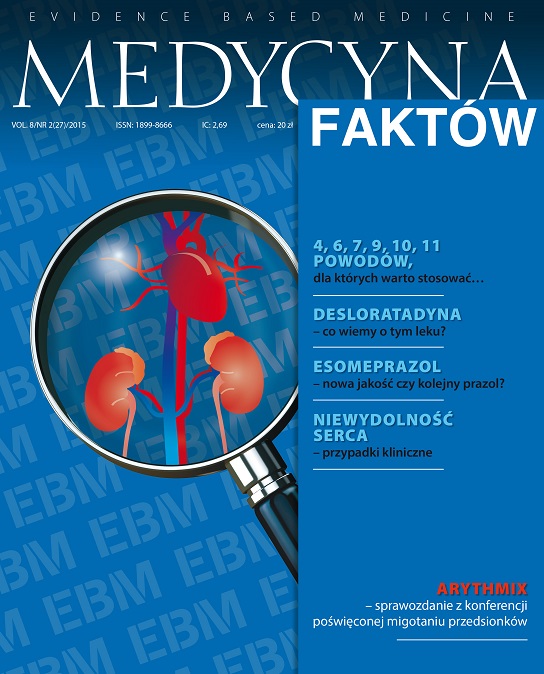10 benefits of using acarbose Review article
Main Article Content
Abstract
Acarbose inhibits α-glucosidase. It can be used together with other anti-diabetic medicines already in the second stage of diabetes treatment. Acarbose reduces postprandial and fasted blood glucose level, equalizes daily glycemic profile, it has no influence on body weight and when administered alone, do not cause hypoglycemia. Acarbose is a safe medication due to the local mechanism of action and does not cause serious side effects.
Article Details
How to Cite
Duda-Król, W. B. (2015). 10 benefits of using acarbose. Medycyna Faktow (J EBM), 8(2(27), 49-52. Retrieved from https://journalsmededu.pl/index.php/jebm/article/view/2311
Issue
Section
Articles
Copyright © by Medical Education. All rights reserved.
References
1. Zalecenia kliniczne dotyczące postępowania u chorych na cukrzycę 2015. Diabetologia Kliniczna 2015; 4(supl. A).
2. IDF DIABETES ATLAS Sixth edition.
3. Cukrzyca – ukryta pandemia.
4. Sieradzki J.: Cukrzyca – kompendium. Via Medica, Gdańsk 2009: 171-180.
5. Sieradzki J.: Miejsce akarbozy w schematach leczenia cukrzycy typu 2 – komentarz. Diabetologia Praktyczna 2009; 10(2): 81-83.
6. Holman R.R., Cull C.A., Turner R.C.: A randomized double-blind trial of acarbose in type 2 diabetes shows improved glycemic control over 3 years (U.K. Prospective Diabetes Study 44). Diabetes Care 1999; 22: 960-964.
7. Sieradzki J.: Leki blokujące alfa-glukozydazę (farmakologia kliniczna oraz charakterystyka poszczególnych preparatów). W: Farmakoterapia w cukrzycy. Grzeszczak W. (red.). Via Medica, Gdańsk 2007: 80-92.
8. Sieradzki J.: Efekt inkretynowy akarbozy. Diabetologia Praktyczna 2010; 11(3): 80-83.
9. Seifarth C., Bergmann J., Holst J.J. et al.: Prolonged and enhanced secretion of glucagon-like-peptide (7-36 amide) after oral inhibition (acarbose) in type 2 diabetic patients. Diabetic Med. 1998; 15: 485-491.
10. Charakterystyka produktu leczniczego Glucobay 100.
11. Chiasson J.L.: Acarbose for prevention of type 2 diabetes mellitus: the STOP-NIDDM randomised trial. The Lancet 2002; 359: 2072-2077.
12. Van de Laar F.A., Lucassen P.L., Akkermans R.P. et al.: Alpha-glucosidase inhibitors for patients with type 2 diabetes: results from a Cochrane systematic review and meta-analysis. Diabetes Care 2005; 28: 166-175.
13. Hanefeld M.: Cardiovascular benefits and safety profile of acarbose therapy in prediabetes and established type 2 diabetes. Cardiovasc. Diabetol. 2007; 6: 20.
14. Rosenthal J.H., Mauersberger H.: Effects on blood pressure of the glucosidase inhibitor acarbose compared with the insulin enhancer glibenclamide in patients with hypertension and type 2 diabetes mellitus. Clinical Drug Investigation 2002; 22: 695-670.
15. Oyama T., Saiki A., Endoh K. et al.: Effect of acarbose, an alpha-glucosidase inhibitor, on serum lipoprotein lipase mass levels and common carotid artery intima-media thickness in type 2 diabetes mellitus treated by sulfonylurea. J. Atheroscler. Thromb. 2008; 15: 154-159.
16. Hanefeld M., Cagatay M., Petrowitsch T. et al.: Acarbose reduces the risk for myocardial infarction in type 2 diabetic patients: meta-analysis of seven long-term studies. Eur. Heart J. 2004; 25: 10-16.
17. Wolever T.M., Chiasson J.L., Josse R.G. et al.: Small weight loss on long-term acarbose therapy with no change in dietary pattern or nutrient intake of individuals with non-insulin-dependent diabetes. Int. J. Obes. Relat. Metab. Disord. 1997; 21(9): 756-763.
2. IDF DIABETES ATLAS Sixth edition.
3. Cukrzyca – ukryta pandemia.
4. Sieradzki J.: Cukrzyca – kompendium. Via Medica, Gdańsk 2009: 171-180.
5. Sieradzki J.: Miejsce akarbozy w schematach leczenia cukrzycy typu 2 – komentarz. Diabetologia Praktyczna 2009; 10(2): 81-83.
6. Holman R.R., Cull C.A., Turner R.C.: A randomized double-blind trial of acarbose in type 2 diabetes shows improved glycemic control over 3 years (U.K. Prospective Diabetes Study 44). Diabetes Care 1999; 22: 960-964.
7. Sieradzki J.: Leki blokujące alfa-glukozydazę (farmakologia kliniczna oraz charakterystyka poszczególnych preparatów). W: Farmakoterapia w cukrzycy. Grzeszczak W. (red.). Via Medica, Gdańsk 2007: 80-92.
8. Sieradzki J.: Efekt inkretynowy akarbozy. Diabetologia Praktyczna 2010; 11(3): 80-83.
9. Seifarth C., Bergmann J., Holst J.J. et al.: Prolonged and enhanced secretion of glucagon-like-peptide (7-36 amide) after oral inhibition (acarbose) in type 2 diabetic patients. Diabetic Med. 1998; 15: 485-491.
10. Charakterystyka produktu leczniczego Glucobay 100.
11. Chiasson J.L.: Acarbose for prevention of type 2 diabetes mellitus: the STOP-NIDDM randomised trial. The Lancet 2002; 359: 2072-2077.
12. Van de Laar F.A., Lucassen P.L., Akkermans R.P. et al.: Alpha-glucosidase inhibitors for patients with type 2 diabetes: results from a Cochrane systematic review and meta-analysis. Diabetes Care 2005; 28: 166-175.
13. Hanefeld M.: Cardiovascular benefits and safety profile of acarbose therapy in prediabetes and established type 2 diabetes. Cardiovasc. Diabetol. 2007; 6: 20.
14. Rosenthal J.H., Mauersberger H.: Effects on blood pressure of the glucosidase inhibitor acarbose compared with the insulin enhancer glibenclamide in patients with hypertension and type 2 diabetes mellitus. Clinical Drug Investigation 2002; 22: 695-670.
15. Oyama T., Saiki A., Endoh K. et al.: Effect of acarbose, an alpha-glucosidase inhibitor, on serum lipoprotein lipase mass levels and common carotid artery intima-media thickness in type 2 diabetes mellitus treated by sulfonylurea. J. Atheroscler. Thromb. 2008; 15: 154-159.
16. Hanefeld M., Cagatay M., Petrowitsch T. et al.: Acarbose reduces the risk for myocardial infarction in type 2 diabetic patients: meta-analysis of seven long-term studies. Eur. Heart J. 2004; 25: 10-16.
17. Wolever T.M., Chiasson J.L., Josse R.G. et al.: Small weight loss on long-term acarbose therapy with no change in dietary pattern or nutrient intake of individuals with non-insulin-dependent diabetes. Int. J. Obes. Relat. Metab. Disord. 1997; 21(9): 756-763.

